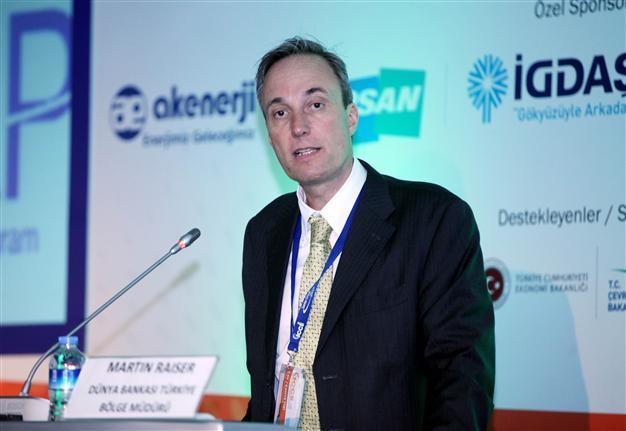Turkey to become global energy hub: World Bank director
ISTANBUL - Anadolu Agency

Martin Raiser. AA Photo
Turkey has a good chance of becoming an energy hub if it maintains the gains it made in the last decade, Martin Raiser, country director for Turkey of the World Bank, said on Friday.
“Turkey has taken major steps in the past decade and nearly half of them were to implement independent regulatory institutions to strengthen the rule of law to improve business opportunities,” Raiser told Anadolu Agency during the International Energy and Environment Fair and Conference in Istanbul.
“It is very important for the government to restore the confidence that investors have in the quality of the regulatory framework and the independence of the regulatory agencies, whether it is the EMRA [Energy Market Regulatory Authority] in energy sector, or the BRSA [Bank Regulation and Supervision Agency] in the banking sector, or the Central Bank in monetary policy,” he said.
“These are absolutely critical achievements that Turkey has had, and shouldn’t give up. For the regulated energy sector, it is particularly important that everyone believes that regulatory agencies are independent and is not subject to political influence and takes even arms-length decisions with regard to market participants,” he said.
Turkey, dependent on energy imports with limited natural sources, established the EMRA in 2001 as an independent regulatory body to oversee oil, gas, electricity and other markets within the energy sector.
Turkey, in need of foreign direct investment, is trying to boost liberalization in energy market to attract investors and has seen an investment of 75 billion dollars in the energy sector since the foundation of the EMRA, according to unofficial figures obtained from the Energy Ministry.
The World Bank is currently working with Turkey’s Energy Ministry to reform the legislation of the natural gas market, which could allow Turkey to attract competing sources of supply for its domestic market and ultimately make it better-positioned to supply European markets.
Turkey is in a strategic geographical location “between major markets in Europe and major supply sources further east,” said Raiser.
The director said this geostrategic advantage increased Turkey’s chances of becoming a global energy hub, adding that Turkey’s geopolitical context required the resolution of some of the political issues around energy resources in the eastern Mediterranean basin and Iraq.
As part of its bid to become an energy hub, Turkey invested in the Trans Anatolia Natural Gas Pipeline (TANAP) to carry Azerbaijani gas to Europe. The recent discoveries of natural gas fields in the eastern Mediterranean off the coast of Israel have introduced an opportunity for Ankara as Turkey is the most feasible route for Israeli gas to reach European and Asian markets.
But the strained relations between Turkey and Israel over the Mavi Marmara incident in 2010 are expected to thaw as both sides have signaled possible reconciliation. Turkey is also attempting to meditate a resolution in Iraq between the central government and the Kurdistan Regional Government (KRG), which will allow Kurdish oil to reach Turkey for re-export.
The bank provided financing for the Baku-Tbilisi-Ceyhan pipeline, which carries Azerbaijani oil to Turkey.
Also, the bank management has recently prepared an analytical study on some interconnection of power systems between Turkey and the South Caucasus, and projects that may bring hydrocarbon resources from the South Caucasus.
“Most of the lending [to Turkey] in the last 12 months has been in the energy sector,” said Raiser. “The World Bank is particularly interested in Turkey to support renewable energy and energy efficiency. Both of them help Turkey save on its energy import bill, and at the same time it can [prevent] carbon emissions.”
The bank is also working with the Turkish Petroleum Pipeline Corporation (BOTAŞ) on building a natural gas storage near Tuzgölü in central Turkey. The project will help Turkey even out the natural gas market by storing gas in times of low demand and releasing it at peak demand, while also enhancing energy security by providing a surplus buffer.
The Turkish Electricity Transmission Company (TEİAŞ) is another customer for the bank in a project to expand transmission systems.
